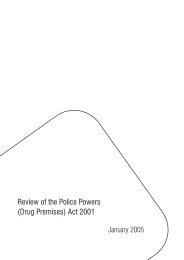Crimes (Forensic Procedures) Act 2000 - NSW Ombudsman - NSW ...
Crimes (Forensic Procedures) Act 2000 - NSW Ombudsman - NSW ...
Crimes (Forensic Procedures) Act 2000 - NSW Ombudsman - NSW ...
Create successful ePaper yourself
Turn your PDF publications into a flip-book with our unique Google optimized e-Paper software.
The Audit Group has advised that it has recently revised the audit tool, and that the new tool, and the new forensic<br />
procedures register, should make it easier for commands to comply with forensic procedure auditing requirements.<br />
The proposed forensic procedures portfolio and designated officer could support this process by reviewing the<br />
electronic recording of procedures on COPS and in custody management records.<br />
4.3. <strong>NSW</strong> Health and the Division of Analytical Laboratories (DAL)<br />
The Division of Analytical Laboratories (DAL) in Lidcombe is responsible for analysing DNA and maintaining the DNA<br />
database.<br />
DAL is part of <strong>NSW</strong> Health, and provides services to a number of government agencies, including <strong>NSW</strong> Police, the<br />
Coroner, the Director of Public Prosecutions, Corrective Services and the Defence Force. DAL provides laboratory<br />
services other than DNA analysis, such as toxicology and drug analysis. DAL also gives expert evidence in court<br />
proceedings.<br />
To gain an understanding of how the DNA analysis process works and the interaction between DAL and <strong>NSW</strong> Police,<br />
we conducted an investigation into the services provided by DAL. The information obtained during our investigation is<br />
used throughout this report.<br />
4.3.1. Arrangements for the DNA analysis service<br />
In December <strong>2000</strong>, DAL and <strong>NSW</strong> Police entered a Deed of Agreement for the provision of DNA analysis services in<br />
accordance with the <strong>Act</strong>. DAL agreed to carry out DNA testing, provide reports to <strong>NSW</strong> Police, give evidence in court<br />
and create and maintain the DNA database system. The Deed of Agreement commenced on the day the <strong>Act</strong> came<br />
into force, and expired at the end of 2003. The original Deed of Agreement has been extended as an interim measure,<br />
while DAL and <strong>NSW</strong> Police discuss the terms of a new agreement.<br />
DAL’s provision of DNA analysis services to <strong>NSW</strong> Police is oversighted by the DNA Advisory Committee, which has<br />
representatives from DAL, <strong>NSW</strong> Police, Legal Aid, <strong>NSW</strong> Privacy, the Director of Public Prosecutions and the National<br />
Institute of <strong>Forensic</strong> Science.<br />
DAL currently uses the “Profiler Plus” system of DNA analysis. For a detailed explanation of this system, see R v<br />
Gallagher [2001]. 313<br />
4.3.2. Accreditation<br />
DAL is reviewed every two years by the National Association of Testing Authorities (NATA), and was most recently<br />
reaccredited in July 2004. NATA reported that the laboratory “demonstrated a good level of compliance with NATA’s<br />
accreditation requirements,” and commented that DAL staff “demonstrated a good level of knowledge and sound<br />
judgment in their areas of expertise.” 314 However, it also commented that DAL has a significant backlog, which “is<br />
having an impact on staff morale,” and recommended “that a case be made to address the resource workload<br />
imbalance that is apparent.” 315 NATA reviewed a number of areas, including DAL’s document control and internal<br />
auditing, as well as technical requirements. It made some observations and recommendations, which DAL has<br />
since addressed to NATA’s satisfaction. 316 DAL’s continued accreditation is also contingent on meeting NATA’s<br />
research and development requirements. DAL has expressed concern that it does not receive funding for research<br />
and development. DNA technology is changing rapidly, and new methods need to be tested before they can be<br />
introduced at DAL.<br />
Until recently, DAL was the only laboratory accredited to conduct DNA analysis for <strong>NSW</strong> Police. However, <strong>NSW</strong> Police<br />
is currently conducting a three month trial (from May to August 2006) outsourcing some DNA analysis to a private<br />
laboratory. 317<br />
4.3.3. Costs of the DNA analysis service<br />
The <strong>NSW</strong> Treasury provided the initial funding required to set up the DNA analysis service at DAL. Since then, DAL<br />
has been funded in part by <strong>NSW</strong> Health (approximately $0.9m) and in part by <strong>NSW</strong> Police (approximately $4.1m). 318<br />
<strong>NSW</strong> Police pays for the DNA analysis on a lump sum basis rather than fee for service model.<br />
In 2002, the Public Accounts Committee’s inquiry into court waiting times recommended, as an immediate measure<br />
to improve the effectiveness and efficiency of exhibit analysis, that the Deed of Agreement between <strong>NSW</strong> Police and<br />
52<br />
<strong>NSW</strong> <strong>Ombudsman</strong><br />
DNA sampling and other forensic procedures conducted on suspects and volunteers under the <strong>Crimes</strong> (<strong>Forensic</strong> <strong>Procedures</strong>) <strong>Act</strong> <strong>2000</strong>

















